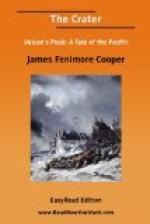Warrington was made judge, with a small salary, all of which he gave to the clergyman, the Rev. Mr. White. This was done because he had no need of the money himself, and there was no other provision for the parson than free contributions. John Woolston, who had read law, was named Attorney-General, or colony’s Attorney, as the office was more modestly styled; to which duties he added those of surveyor-general. Charles received his salary, which was two hundred and fifty dollars, being in need of it. The question of salary, as respects the governor, was also settled. Mark had no occasion for the money, owning all the vessels, with most of the cargo of the Rancocus, as well as having brought out with him no less a sum than five thousand dollars, principally in change—halves, quarters, shillings and six-pences. Then a question might well arise, whether he did not own most of the stock; a large part of it was his beyond all dispute, though some doubts might exist as to the remainder. On this subject the governor came to a most wise decision. He was fully aware that nothing was more demoralizing to a people than to suffer them to get loose notions on the subject of property. Property of all kinds, he early determined, should be most rigidly respected, and a decision that he made shortly after his return from America, while acting in his capacity of chief magistrate, and before the new court went into regular operation, was of a character to show how he regarded this matter. The case was as follows:—
Two of the colonists, Warner and Harris, had bad blood between them. Warner had placed his family in an arbour within a grove, and to “aggravate” him, Harris came and walked before his door, strutting up and down like a turkey-cock, and in a way to show that it was intended to annoy Warner. The last brought his complaint before the governor. On the part of Harris, it was contended that no injury had been done the property of Harris, and that, consequently, no damages could be claimed. The question of title was conceded, ex necessitate rerum. Governor Woolston decided, that a man’s rights in his property were not to be limited by positive injuries to its market value. Although no grass or vegetables had been destroyed by Harris in his walks, he had molested Warner in such an enjoyment of his dwelling; as, in intendment of law, every citizen was entitled to in his possessions. The trespass was an aggravated one, and damages were given accordingly. In delivering his judgment, the governor took occasion to state, that in the administration of the law, the rights of every man would be protected in the fullest extent, not only as connected with pecuniary considerations, but as connected with all those moral uses and feelings which contribute to human happiness. This decision met with applause, and was undoubtedly right in itself. It was approved, because the well-intentioned colonists had not learned to confound liberty with licentiousness; but understood the former to be the protection of the citizen in the enjoyment of all his innocent tastes, enjoyments and personal rights, after making such concessions to government as are necessary to its maintenance. Thrice happy would it be for all lands, whether they are termed despotisms or democracies, could they thoroughly feel the justice of this definition, and carry out its intention in practice.




